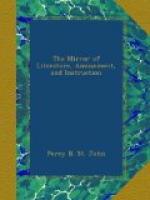This work, although not original, may be said to be the superstructure of Sir Walter Scott’s fame. It consists, as we have already hinted, of the ballad poetry of the Border district; but to obtain this vernacular literature was not the work of mere compilation. The editor’s task was not performed in the closet, but in a sort of literary pilgrimage through a land of song, story, and romance. The farmers and peasantry from whose recitation the ballads were to be set down, were a primitive race; and the country among which oral traditions, anecdotes, and legends were to be collected for notes illustrative of the ballads, was of the most romantic character. Sir Walter found the most fertile field in the pastoral vale of Liddesdale, whither he travelled in an old gig with Mr. Shortreed, an intelligent observer of the manners of the people. In these researches, Sir Walter evinced a most retentive memory: he is stated to have used neither pencil nor pen, but to have made his own memoranda by cutting notches on twigs, or small sticks.[6] The Minstrelsy was published in 1802, in two volumes; it was reprinted in the following year with a third volume, of imitations, by Scott and others, of the ancient ballad; but Sir Walter refers to the second edition as rather a heavy concern.
[6] Many anecdotes are related
in illustration of Sir Walter
Scott’s
excellent memory. The Ettrick Shepherd tells of
his
attempting to sing his ballad of Gilmanscleuch,
which
had never been printed or penned, but which the
Shepherd
had sung once over to Sir Walter three years
previously.
On the second attempt to sing it, says the
Shepherd,
“in the eighth or ninth verse, I stuck in it,
and
could not get on with another line; on which he (Sir
Walter)
began it a second time, and recited it every word
from
beginning to the end of the eighty-eighth stanza:”
and,
on the Shepherd expressing his astonishment, Sir
Walter
related that he had recited that ballad and one of
Southey’s,
but which ballads he had only heard once from
their
respective authors, and he believed he had recited
them
both without missing a word. Sir Walter also used
to
relate
that his friend, Mr. Thomas Campbell, called upon
him
one evening to show him the manuscript of a poem he
had
written—The Pleasures of Hope.
Sir Walter happened
to
have some fine old whisky in his house, and his friend
sat
down and had a tumbler or two of punch. Mr. Campbell
left
him, but Sir Walter thought he would dip into the
manuscript
before going to bed. He opened it, read, and
read
again—charmed with the classical grace,
purity, and
stateliness
of that finest of all our modern didactic
poems.
Next morning Mr. Campbell again called, when to his




